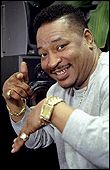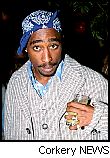Pioneering NYC Hip-Hop DJ speaks on this new age in the music
"I knew rap was going to get bigger," says Mr. Magic, who was playing it on the radio in the early '80s when most adults were just praying it would go away.

"But I never thought we'd have radio stations playing it full-time. And look at Lauryn Hill and the Grammys. Some people say she's not a rapper because she can sing, but that record is pure hip-hop."
He leans back and smiles. It's nice to win.
Tomorrow night at Club Amazura in Queens, many of the biggest names in rap music, plus most of the staff from hip-hop WQHT (97.1 FM, where Magic is a weekend deejay) will join him in a victory celebration of sorts: a mega-bash to celebrate his 20th anniversary on radio.
Many of those artists, who will include Run-DMC and Big Daddy Kane, got their first radio break from Mr. Magic, whose persistence was a big reason that the much-reviled rap sound lived to become the most influential music culture over the last years of the 20th century — on pop radio, in dance, in ads, in video, in fashion.
Tyrone Williams, Magic's long-time friend and partner in 3rd Power Enterprises, a full-service music production company, says that without Magic, rap's history would have been much different.
"Magic was the only one playing rap on the radio back then," Williams says. "In 1984, when he was on WBLS, they told him record companies weren't making any money on rap, so they wanted him to start doing a Quiet Storm format. They figured if Magic dropped rap, the kids would figure it was over, too.
"But he knew he couldn't abandon them. So he left 'BLS and he went back to WHBI, buying his own airtime, just to keep playing rap."
Magic laughs as Williams runs through this riff.
"Those aren't all my words," says Magic. "But radio was very important in those days, because that was the only outlet. Today you've got mix tapes and videos. But back then, radio was it. After a show, I'd have artists lined up to hand me their tapes."
He helped dozens of artists get their break, from Kurtis Blow, Whodini, the Fat Boys and the Force MD's to Will Smith. But maybe the biggest breakthrough came when UTFO recorded a song called "Roxanne" — and then backed out of promoting it with Magic because WRKS had picked up the song.
So Magic and his deejay, Marly Marl, had a friend of Marl's call herself Roxanne Shante and record an answer song. The Roxanne phenomenon lasted for months.
By mid-1985, WBLS had hired Magic back, partly because rival WRKS had hired DJ Red Alert to play rap there. Magic and Red Alert became the twin towers of early commercial rap radio.
"People assumed that because we were rivals on the radio, we must be enemies," says Magic. "Not true. I've known Red for years now, and we're like family. We've been through it all together."
Magic, who calls himself "a Bronx kid" even though he went to Hughes High in Manhattan, got the radio bug in 11th grade when he got to play deejay at a career expo.
"That was it," he says. "I loved the feeling of power."
Already a big fan of Crocker and WWRL's Hank Spann, Magic developed his deejay skills at parties. "I was in demand because I had a big record collection," he says with a laugh. "We called what we did mixing, but it was really just playing records on two turntables. Real primitive. Then we'd see people who had the equipment to really mix, and we learned."
Eventually he bought the only time available on WHBI, 2 a.m. Saturday and Sunday, and launched "Mr. Magic's Disco Showcase." Then Crocker hired him at 'BLS.
These days, Magic does 4-10 a.m. Saturday and the 7-9 p.m. "Sunday Classics" on Hot 97. Weekdays, he works at 3rd Power, and he says within five years he may leave radio.
But not the music. He recently assembled a CD, "Hot 97 Presents Mr. Magic's Classic Old School Flavas," to acknowledge the pioneers that he says "still aren't getting the full respect they deserve."
So tomorrow night's party will also be a thank-you, he says, to everyone. Ed Lover, Angie Martinez and Bugsy are the hosts; doors open at 9. For more information, call (212) 691-0040.
The Lesson From Tupac and Biggie
The worst one-two tragedy in hip-hop history, the still-unsolved murders of Tupac Shakur in September 1996 and Biggie Smalls in March 1997, has turned out to have a lifesaving impact on countless fans, suggests Mr. Magic.

"Their deaths, terrible as they were, woke people up," Magic says. "It made some of the kids see what we'd been trying to tell them for years — that it's dangerous to take the life you hear about in song lyrics or see in the movies and start thinking it's your reality.
"After Tupac and Biggie got killed, I could see people starting to turn away from gangs and guns. It's not glamorous, like it is in songs or in videos. It puts you in a world where you don't want to be."
Magic says it took him a while to get over the deaths of Tupac and Biggie, both of whom mentioned him in songs.
"But you have to take a negative and turn it into a positive," says Magic. "Something terrible happens, you learn from it and move forward. What happened to Biggie and Tupac could end up saving a lot of kids' lives, because it showed them that wasn't the way they should live."
-- David Hinckley - 3/03/99